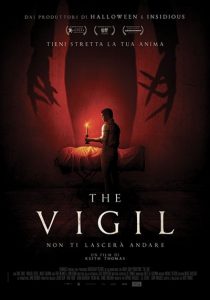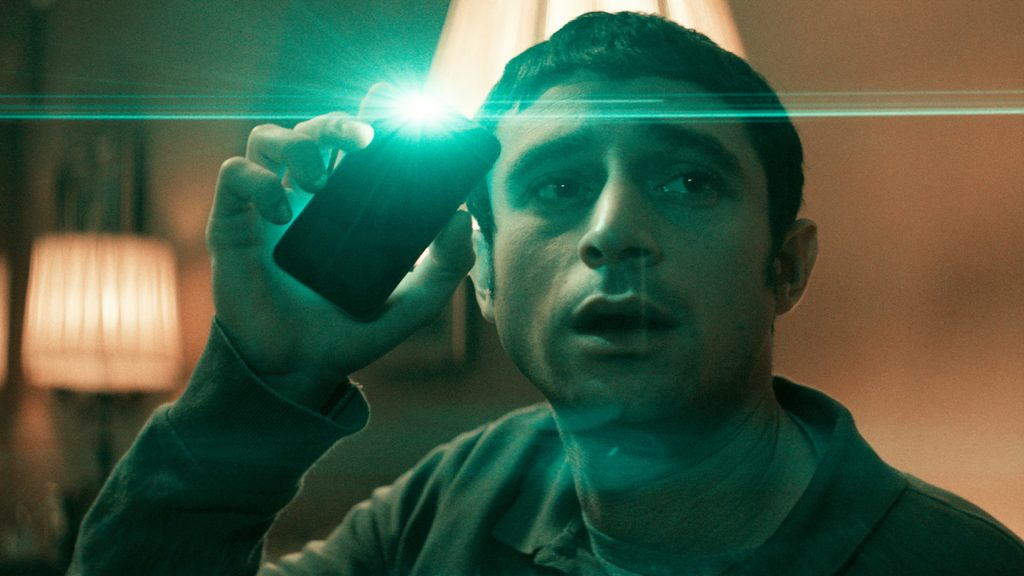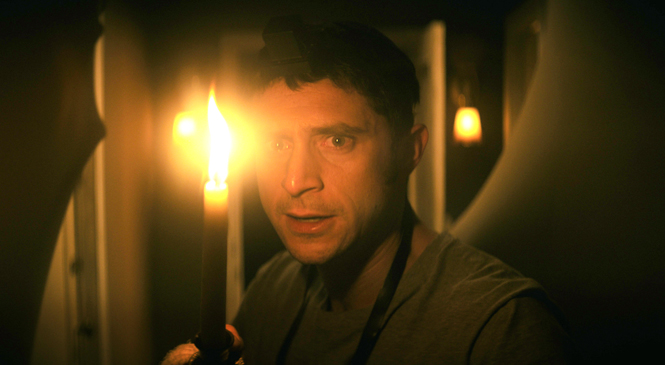THE VIGIL Is More Than The Orthodox Horror Story


The Vigil (2021)
Directed by Keith Thomas
Written by Keith Thomas
Produced by Raphael Magules, J.D. Lifshitz, Adam Margules
PG-13, 88min
Who doesn’t like an old-fashioned ghost story? Who doesn’t like an old-fashioned ghost story about Orthodox Jews? That’s what we get with Keith Thomas’s debut feature film, The Vigil.
Some brief exposition at the beginning of the film explains the religious rites of the vigil and the role of a shomer. When a Jew dies, a shomer has to stay up all night with the body. A shomer’s role is to provide protection and comfort to the soul of the recently deceased. Enter Yakov (Dave Davis), a former Hasidic Jew, at a support group for former Hasidic Jews. Adjusting to secular life is a challenge. Yakov has money trouble, he has to choose between medication and food. It’s not all bad, though. Sarah, a cute girl in the group, just asked for Yakov’s cell phone number. Yakov has never had a cell phone before and is excited about his new technology.
Menashe Lustig’s character, Reb, is waiting for Yakov on the street once the meeting adjourns. He has a job for Yakov as a shomer. Yakov desperately needs money and this is a paying gig. What ensues is a cerebral, haunting, and suspenseful tale of trauma, mental anguish, and supernatural religious horror.
It is a relief to see a religion other than Christianity as the subject of a horror film. In a world full of copycats and clones of The Exorcist and The Omen, something new is appreciated. However, this is more than just the Jewish horror film. The Vigil is a clever low budget effort that relies on psychology and mood as opposed to special effects and jump scares. The performances also deserve special mention. I don’t think I have ever seen a movie this authentically cast. Half the movie is understandably in Yiddish, which means native speakers were cast. Dave Davis delivers a powerhouse one man performance that takes Yakov’s vulnerability and sanity to the brink.
The movie starts with long, handheld tracking shots that follow the characters with the action. This kind of movement starts in the support group and continues as we follow Yakov and Reb down the street. Once Yakov is at Mrs. Litvak’s house to be the shomer, the camera barely moves at all. Instead, we get well composed tripod shots that let us see every subtle movement in the frame. This is how The Vigil uses suspense and timing to create atmosphere. This atmosphere is so necessary to making the scares, mood, and horror of the piece come alive.

The lighting is also distinctive. Cell phone use is featured, with an eerie green light hitting Yakov’s face every time he pulls out his phone. This unnatural looking light creates atmosphere and demonstrates the isolation Yakov is feeling. Yakov is texting Sarah throughout the film, and these moments of loneliness show just how vulnerable Yakov is. He simply wants to connect with another human being. This, coupled with his deep dark secret, his reason for leaving the Hasidic life, makes him someone to root for.
The film toes the line between revealing too much and not revealing everything quite well. The themes of Yakov’s PTSD help to create a sense of mounting dread. This dread culminates in a rather spooky Yiddish folk story about the Mazik, an evil demon with a backwards head. The less said about this legend to explain the plot the better; however, there is more than a passing similarity to S. Ansky’s The Dybbuk. A dybbuk is a malicious possessing spirit from Yiddish folklore that is believed to be the dislocated soul of a dead person. The play concerns a young woman possessed by the spirit of her dead lover. Mrs. Litvak and her late husband represent the old-world Yiddish mysticism that’s present in the characters of The Dybbuk.
This synthesizes old world Hasidic values with the postmodern malaise of tragedy, isolation, and our struggles with strange technologies. Yakov’s isolation in his new cell phone demonstrates this loneliness, that is every bit as troubling and repressive as the isolation of a highly orthodox religious community. The artificial green light that illuminates Yakov’s face is unnatural and creepy. This is the perfect cinematic symbol to convey this isolation.
At the same time that Yakov is experiencing this loneliness, he is making connections with new people, both young and old. Yakov is isolated, but the silver lining is that he is also more sociable than he ever has been. It is these new sets of social skills that allow him to leave and enter the world of Orthodoxy on his own terms. Developing these skills was an incredibly frightening, and traumatizing experience for Yakov. I think this emotional connection is what makes The Vigil a very effective horror film.
The Vigil opens in select theaters, digital and video on demand Friday, February 26.
![]()



